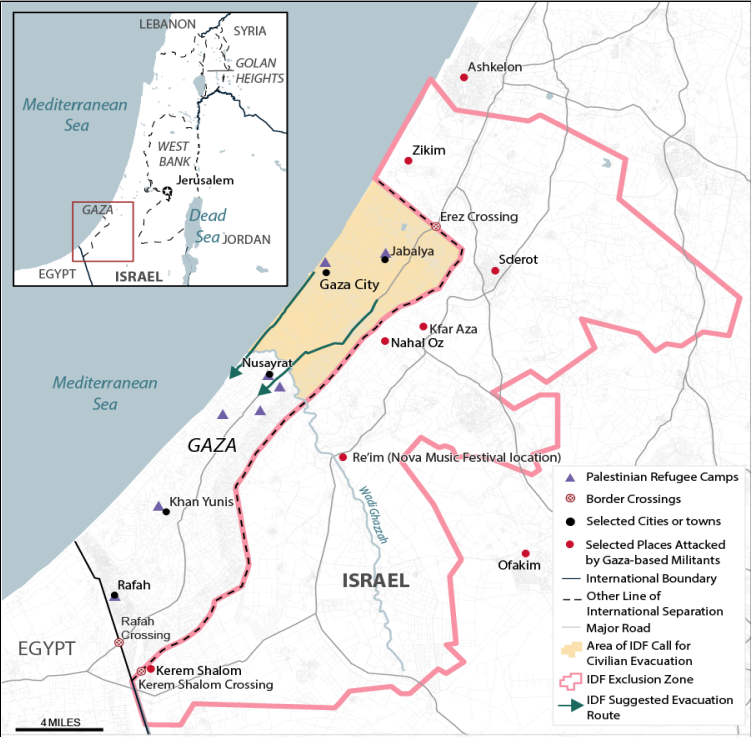
The following is the Nov. 30, 2023, Congressional Research Service report, Israel and Hamas 2023 Conflict In Brief: Overview, U.S. Policy, and Options for Congress.
From the report
On October 7, 2023, the Palestinian Sunni Islamist group Hamas (a U.S.-designated foreign terrorist organization, or FTO) led surprise attacks against Israel from the Gaza Strip by land, sea, and air. The assault came on a Jewish holiday, 50 years after the Egypt-Syria surprise attack on Israel that sparked the 1973 Yom Kippur War. The October 7 assault’s scope and lethality against Israel have no precedent in the 16 years Hamas has controlled Gaza, and the nature of the violence stunned Israelis. The apparent intelligence and operational failures in preventing the assault have become a subject of analysis for Israeli and U.S. officials. Iran reportedly provides material support to Hamas, and according to U.S. officials may be complicit in a broad sense, but President Joe Biden said in October “there is no evidence” that Iran helped plan the attack.
In response to the October 7 attacks, Israel’s cabinet formally declared war on Hamas. Israel has conducted aerial bombardment and ground operations in Gaza, and also has halted electricity, food, and fuel supplies to Gaza from Israeli territory. Some life-sustaining goods are entering Gaza via Egypt, but U.S. and U.N. officials have sought to boost this aid. Israeli Prime Minister Benjamin Netanyahu has announced that Israel’s military objectives are “To destroy the military and governmental capabilities of Hamas and bring the hostages home.”
In October, Israel called for civilians in northern Gaza to move south. As of late November, the Israel Defense Forces (IDF) seems to control much of northern Gaza above ground, and is apparently preparing for major operations to confront key elements of Hamas’s military and political leadership in the group’s vast network of tunnels and in some areas of the south. The United Nations has stated that Gaza, with more than 1.8 million Gazans displaced (out of a population of approximately 2.1 million people) constitutes a major humanitarian crisis—having already faced dire economic and humanitarian conditions before the conflict. The Biden Administration has stated that Israel has the right and obligation to defend itself, and has resisted calls from other international actors for an indefinite cease-fire. However, U.S. leaders have reportedly warned Israeli counterparts that global outcry over civilian suffering could reach “a tipping point,” and have cautioned against Israeli military operations in southern Gaza unless and until Israel can demonstrate plans for protecting civilians there.
Reportedly, more than 1,200 Israelis and foreign nationals (including 35 U.S. citizens in Israel) and more than 15,000 Palestinians in Gaza have been killed as of November 29. Hamas and other groups also seized around 240 hostages on October 7. Via talks involving Qatar, Egypt, and the United States to address the hostage situation, Israel and Hamas agreed to a multi-day pause in fighting that began on November 24. During the pause, 97 hostages held in Gaza and 210 Palestinian prisoners held by Israel have been released as of November 29, and increased humanitarian supplies have come into Gaza. Hamas and others reportedly hold 140 or more persons, including six to eight Americans.
There are risks that the conflict could expand. For example, the Iran-backed Shia Islamist group Lebanese Hezbollah (another FTO) has exchanged fire with Israel and could create a second front at the Israel-Lebanon border. U.S. statements and actions, including expedited arms deliveries to Israel and the movement of major U.S. military assets, appear intended to warn Hezbollah or others not to get involved. U.S. officials have warned Iran of a strong response if groups Iran supports continue to target U.S. military positions in the region. Additionally, amid rising violence between Palestinians and Israelis in the West Bank, President Biden has called for attacks by “extremist settlers” against Palestinians to stop.
Israeli Prime Minister Netanyahu has said that Israel will have overall security responsibility for Gaza for an indefinite period after the conflict, while U.S. officials have said that a potentially transitional Israeli security presence should not prevent the West Bank-based Palestinian Authority (PA) from resuming governance responsibilities in Gaza, in connection with efforts to move Israel and the Palestinians away from violence and toward a two-state solution.
In October 2023, President Biden asked Congress to appropriate more than $8 billion in U.S. security assistance for Israel, and more than $9 billion in global humanitarian assistance amounts that could partly be allocated for Gaza, the West Bank, and Israel. Members of Congress have expressed differing views on the request and its various elements. Congress also may weigh other legislative and oversight options.
Download the document here.
"conflict" - Google News
December 01, 2023 at 09:47PM
https://ift.tt/RkcgZQ3
Report on Israel and Hamas 2023 Conflict, U.S. Policy Options - USNI News - USNI News
"conflict" - Google News
https://ift.tt/81epINX
https://ift.tt/mgDsyrh
Bagikan Berita Ini














0 Response to "Report on Israel and Hamas 2023 Conflict, U.S. Policy Options - USNI News - USNI News"
Post a Comment